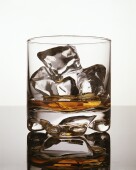 |
 |
 |

Booze Taxes Lower Drinking Rates
Price hikes affect wide range of tipplers, study finds|
|
HealthDay
Thursday, January 15, 2009
 THURSDAY, Jan. 15 (HealthDay News) -- The more alcohol costs, the less people drink it.
THURSDAY, Jan. 15 (HealthDay News) -- The more alcohol costs, the less people drink it.
That's the conclusion of a new analysis of data from more than 100 studies gauging the impact of higher booze pricing -- typically in the form of higher taxes -- on American drinking habits.
"The price level at which alcohol is sold affects what people drink," observed Alexander C. Wagenaar, a professor of epidemiology and health policy research at the University of Florida's College of Medicine. "And the pattern clearly appears to be that when prices go down, people drink more. And when prices go up, people drink less."
"I don't think it's that surprising," acknowledged Wagenaar. "But it is very important. Because drinking is one of the leading causes of death and medical problems and injuries and addiction. So, we are constantly trying a variety of things to prevent these consequences. And here we find overwhelming, cumulative scientific evidence involving over a hundred studies that show that there is, in fact, a good tool that, no question, shapes drinking practices."
The analysis was reported in the Jan. 15 online issue of the journal Addiction.
In the study, Wagenaar and his colleagues searched databases dating back (in some cases) to the 19th century. They selected 112 studies tracking the relationship between alcohol pricing and consumption.
For the most part, Wagenaar said, the studies examined the impact of price through the prism of taxation, because "holding everything else constant, what affects prices is tax. In fact, prices and taxes are so intimately connected, they're really one and the same thing."
His team found repeated evidence that prices/taxes affect the consumption of all types of alcoholic beverages, as well as all the drinking behavior of all types of drinkers, from young to old and from light to heavy drinkers.
In fact, hiking the price of alcohol via taxation is the most consistently successful means of reducing drinking, the researchers said.
Other factors can affect the way tax and price manipulation play out, including the geographical region affected, the timing of price changes, and the average income of the local population.
The findings echo those of another study, also conducted by Wagenaar's group, that found that deaths from alcohol-linked disease decline as the price of a drink rises. Those findings were published in the American Journal of Public Health in November.
Just how much of a tax increase is necessary before drinking habits change?
"Well, if you do a survey, and ask the general public if they would change their drinking practices if the price went up by, say, a dime, everyone would say no," he noted. "But in the aggregate, across the whole population, when you do these studies, you do see a direct relationship between a modest price increase and consumption drops. It really doesn't take much to see the difference."
One expert said that price changes need to be dramatic to effect real population-wide change, however.
"Given the fact that excessive alcohol use is harmful, there's a rationale for increasing taxation on alcohol because, sure, the more you increase it, the more you would cut back on use," said Dr. Marc Galanter, director of the division of alcoholism and drug abuse in the department of psychiatry at New York University School of Medicine in New York City. "But you'd have to increase it tremendously -- to rather high and punitive levels -- to have a major impact."
"So, the question is whether it is feasible to raise the price of alcohol through taxation to the extent that it would materially affect the abusive use of alcohol," he said. "Practically speaking, beer, for example, is no more expensive than a carbonated beverage, by and large. So, among college-age and under-age drinkers -- some of whom will become alcohol-dependent because of heavy use during their youth -- how much would you really have to increase the price of beer in order to have a material impact? A lot," Galanter said.
HealthDay
Copyright (c) 2009 ScoutNews, LLC. All rights reserved.
Related News:
More News on this Date
Related MedlinePlus Pages:
| Home | Health Topics | Drugs & Supplements | Encyclopedia | Dictionary | News | Directories | Other Resources | |
| Disclaimers | Copyright | Privacy | Accessibility | Quality Guidelines U.S. National Library of Medicine, 8600 Rockville Pike, Bethesda, MD 20894 National Institutes of Health | Department of Health & Human Services |
Date last updated: 16 January 2009 |




